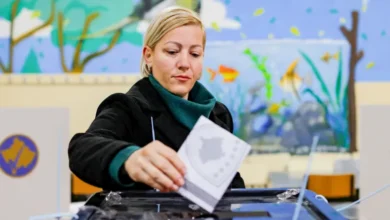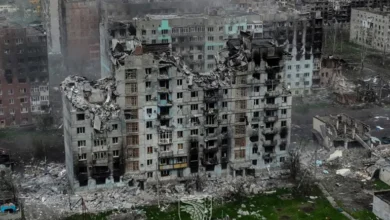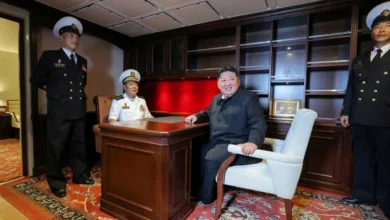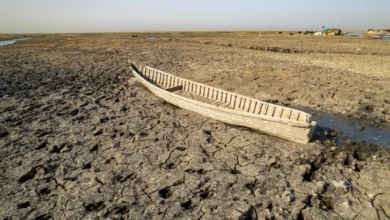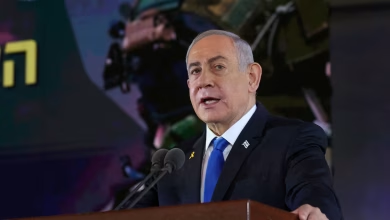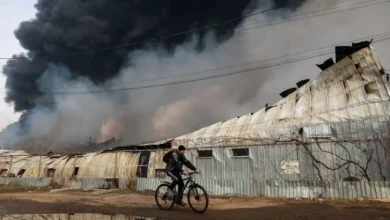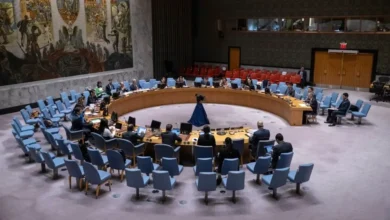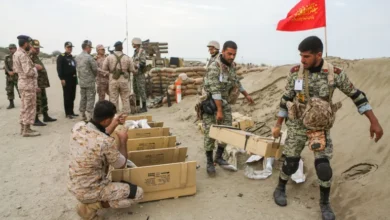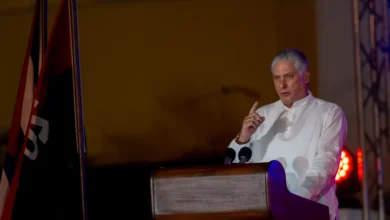Will the UK’s policy on Israel-Palestine shift under new PM Starmer?

Israa Saleh, a petite and softly spoken Palestinian doctor who wears a colourful hijab, has mourned for months.
Her colleague Maisara al-Rayyes was killed in November when an Israeli air strike flattened his family home in Gaza City. His remains are still under the rubble.
Saleh described al-Rayyes, who like her was awarded a prestigious Chevening scholarship by the British government, as a “brother”.
“I still grieve over the loss,” she told Al Jazeera in Deir el-Balah, the central Gaza city she has fled to having been displaced 10 times in the past nine months. “This war has stolen everything from us.”
She returned to Gaza in 2022 having completed a master’s degree in Liverpool, a city that reminded her of the Strip with its “coastal nature” and “amazing” people.
Rishi Sunak was then the new Conservative prime minister. Back at home, Saleh worked with Medecins du Monde, the international humanitarian organisation, and planned to marry.
But a year later, Israel’s latest and deadliest onslaught of Gaza crushed her wedding dreams as spending time with her fiance became impossible and venues were bombed.
Having lived in northwest England for more than a year, Saleh, 30, closely followed the recent United Kingdom election that ushered in the first Labour government in 14 years. Now, she’s cautiously hoping for Britain to change its position on the war.
“I wasn’t really surprised when [Labour leader] Keir Starmer won,” she said. “But nothing really gives me hope as much as the protests erupting in the country. This may indeed pressure Labour to act.”
She believes the UK is “politically complicit in the genocide” on the one hand, given its support of the Israeli army, while “aiding the population” on the other, having delivered some humanitarian assistance to the Strip.
Asaad al-Kurd, a 51-year-old English teacher and father-of-six in Deir el-Balah, is less hopeful.
He usually tracks global headlines. But having lost his sister and her children to the war, and scores of other relatives, his life feels too “hellish” to engage in the news.
“I felt detached from this year’s elections,” he said. “Both Labour and the Conservatives are complicit in the genocide. Keir [Starmer] and Rishi [Sunak] have pledged unrivalled military support for Israel and justified Israel’s monstrous war crimes … Whatever they say doesn’t give me any sense of hope. Nothing will change at all.”
He likened the UK to Washington’s “tail” since their foreign policy is closely aligned.
“[But] we need to remember that the UK is behind our catastrophe,” he said. “The Conservative Prime Minister Arthur Balfour gave Israel land in Palestine.”
War in Gaza ‘top of mind in terms of foreign policy’
Al-Kurd is a teacher with UNRWA, the agency that several countries including the UK stopped funding after Israel claimed 12 of its 30,000 staffers played a part in the Hamas-led October 7 incursion into southern Israel, during which 1,139 people were killed. Israel has not provided evidence to support these allegations.
As the death toll in Gaza nears 40,000 people, Olivia O’Sullivan, director of the UK in the World programme at the Chatham House think tank, said the war is “top of mind in terms of foreign policy” for the new Labour government.
She told Al Jazeera that changes in “big policy questions”, as opposed to differences in rhetoric, would signal a departure from the previous Tory administration.
Resuming UNRWA funding, a shift on arms exports to Israel, or explicitly backing the jurisdiction of international courts would indicate that Labour was on a different path, she said.
In opposition, Starmer regularly expressed solidarity with Israel and upset many when he said it had the right to cut off Gaza’s water and power supplies. He soon retracted that statement, but his overall position cost Labour four seats to pro-Palestine independent candidates and widened a rift with British Muslims who have traditionally supported the party.
Starmer voted against a parliamentary motion demanding an immediate ceasefire in November. Ahead of the election, during a radio interview, he said he would not “pronounce that something is either genocide or not” as he reaffirmed Israel’s “right to self-defence”.
But he also said that every country including Israel “has to be properly held to account in the court of international law” and promised to review legal advice on arms sales to Israel as prime minister.
David Lammy, the new foreign secretary who is expected to visit Israel soon, broke ranks with the UK’s official line in late May when he backed the International Criminal Court’s independence after it sought arrest warrants for Israeli officials and Hamas leaders for alleged war crimes.
The Tories said the ICC did not have jurisdiction in the case, while US President Joe Biden claimed it was “outrageous” to suggest any equivalence between Israel and Hamas.
